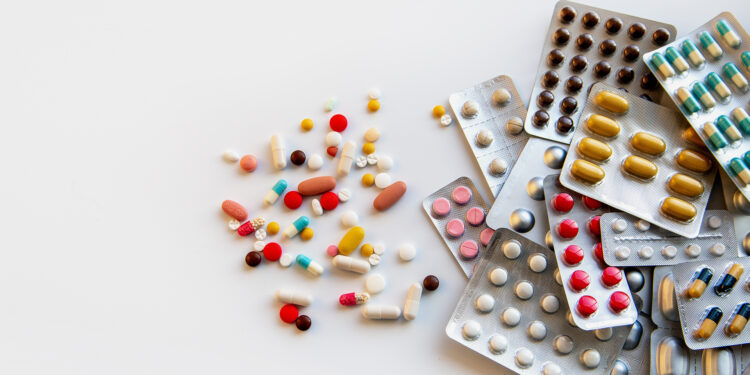US President Donald Trump’s decision to impose a “most preferred country” policy in pricing medicines has caused a wide shock in global pharmaceutical markets.
In a post on the “Truth” platform, Trump announced that the United States will start immediately paying “the same price that the country has the lowest price in the world”, promising to reduce medicine prices by between 30% and 80%.
A reaction in the global markets
These statements caused a sharp decline in the shares of pharmaceutical companies around the world, according to the Israeli economic newspaper “Globes”, the arrow of the “Tasa’a Pharmaceutical Industries” company decreased by 7% on the Tel Aviv Stock Exchange, amid fears that the inclusion of the drug “Ostido”, which is the pioneering medicine with the company and is used to treat involuntary movements among Huntington patients, within this policy to reduce the company’s revenues.
“If the decision includes this medicine, every decrease of 1% in its price will be reflected in a similar decrease in the company’s cash flow,” Uri Hirchkovitz, director of the hedge fund, Banu Pharma, told the newspaper.
According to the newspaper itself, the losses were not limited to “Tafaa”, the shares of the Japanese company “Chogai” decreased by 11%, the Japanese “Takada” company by 5.5%, and the Korean company “Celion” by 3.9%, and the Indian company “San Pharma” – the owner of the Israeli company “Taro” – by 3%.
A widespread effect on the American market
The shares of American companies also recorded a remarkable decline, according to the Bloomberg Agency, the shares of “Pfizer”, “Merck” and “Amin” fell between 3% to 6% after Trump’s announcement.
The “Market Watch” platform confirmed that the advertisement raised investor concerns about the contraction of profit margins and the absence of clarity regarding the mechanisms of application.
In a report of the “Barons” magazine, analysts explained that the new policy will depend on pricing “Medicir” drugs to compare prices in the United States with those accredited in countries such as Germany and Canada, which may lead to a sharp decrease in the compensation of pharmaceutical companies.
Industry concern about implementation and repercussions
This policy has received widespread criticism from within the pharmaceutical industry sector, and the Associated Press quoted sources in the industry as saying that imposing this policy would cause great harm to companies’ capabilities to finance research and development.
“Prices control policies in this way will eliminate our ability to innovate in the future,” said one of the executives without revealing his name.
Uri Hirchkovitz, in turn, stressed that the presidential decree alone does not have sufficient legal force to implement the discounts, unless supportive legislation is passed in Congress. “The pharmaceutical lobby has tremendous influence in Congress, but if the Democrats – who have always supported such policies – support this trend, we may witness actual changes,” he told the newspaper “Globes”.
Possible winners
On the other hand, some parties may benefit from this policy, and according to the “Clinical Trails Arena” website, companies specialized in the production of sexual drugs (alternatives) and biological (biological) alternatives may benefit from pressure on the prices of original drugs.
In an analysis published by the “Economic Times” newspaper, it was indicated that patients and health care systems may achieve significant financial savings, which may increase the demand for medicines in the future, especially those produced at a low cost.
Political background and repetition of previous policies
The Daily Best magazine considered that Trump’s move is not completely new, but rather an updated version of previous attempts to his first presidential term in 2020. The magazine considered that the last announcement comes in the context of fulfilling electoral promises and pressure on pharmaceutical companies.
Market indicators so far 2025:
- Tafaa (Israel): decreased by 7%.
- Choghai (Japan): decreased by 11%.
- Takda (Japan): decreased by 5.5%.
- Celionon (Korea): decreased by 3.9%.
- San Pharma (India): decreased by 3%.
- Pfizer, Merck, Amsin (United States): Reduced between 3% to 6%.
Trump’s advertisement is a major shift in the US -pricing file in the United States, with repercussions that extend from financial markets to innovation models. While the decision promises to reduce the burden on patients and taxpayers, its implementation collides with legal and legislative obstacles, and raises questions about the future of investment in the global pharmaceutical sector.
As Reuters reported, the complete impact of this policy will depend on the ability of Congress to pass the necessary legislation, details that have not been clear yet.



